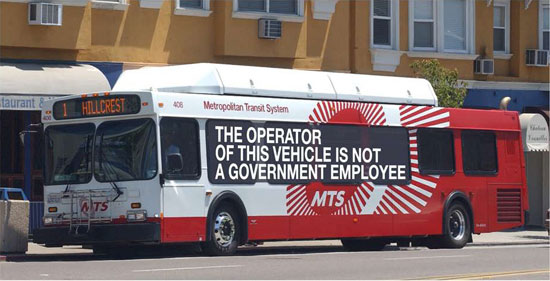Bill would spell it out, big time
July 18, 2013
Los Angeles transit and county officials have seen the proposed writing on the bus—and they don’t like it one bit.
A bill now under consideration in the state Assembly would require that signs—huge ones, in some cases—be placed on government vehicles driven by contractors to indicate that they are not government employees.
Michael Turner, the Los Angeles County Metropolitan Transportation Agency’s director of government relations, quipped that the sign amounts to a “scarlet letter” for contract employees.
On Tuesday, the Los Angeles County Board of Supervisors, acting on a motion by Supervisor Michael D. Antonovich, voted to oppose the legislation because of costs associated with installing the new messages. Metro’s Board of Directors will take up the matter at next week’s meeting. The San Diego Metropolitan Transportation System and the California Transit Association, which represents transit providers statewide, have already voiced their opposition as well.
The bill, SB-556, is being sponsored by state Senate Majority Leader Ellen Corbett (D-East Bay). According to a fact sheet from one of the bill’s co-sponsors, the California Labor Federation, the bill represents an attempt to reverse a trend toward increased use of contractors and temporary workers, who do not have the same benefits and protections as staff employees. It also aims to inform the public about who is providing services and who is accountable for them.
But for local officials and Metro, the devil is in the details.
As the bill currently reads, the following messages would be required on contractors’ uniforms and vehicles: “THIS IS NOT A GOVERNMENT EMPLOYEE” and “THE OPERATOR OF THIS VEHICLE IS NOT A GOVERNMENT WORKER.”
The font would have to be as large as the largest font otherwise displayed. Because logos are in large type, in Metro’s case that means the messages would be “as large as bus wrap ads, the ones that have the vehicles almost completely covered,” said Metro’s Turner. He said it would cost $1 million to install the signs, in addition to lost revenue from advertising that would otherwise occupy the space. Metro’s 148 contract buses currently display smaller messages to indicate they are operated by private companies.
Chris Patterson, the political director for the organization California Professional Firefighters, another co-sponsor of the bill, acknowledged that the language may need to be “tweaked.”
“This thing is not in final format by any stretch of the imagination,” said Patterson. “We left it intentionally vague so it can be changed as it goes through the process.”
“That said,” Patterson added, “we do strongly believe the public deserves to know who is showing up at their door and performing vital public services. We don’t see how more transparency would be bad.”
As the bill reads now, however, it would place a burden on transit providers—not just giants like Metro—but also smaller ones like the Topanga Canyon Summer Beach Bus and the Agoura Hills Dial-a-Ride.
“This seems a little overkill,” said Amy Brink, who manages the Agoura Hills service. “We are a small city so we have to contract out a lot of our services. We’re not large enough to have a full transit staff.”
Brink expressed concern that people who use her dial-a-ride—most of whom are seniors or disabled—would be confused by the signs.
“With all the details that are already required, I can’t imagine that they could fit anything more on there,” Brink said.
The bill was passed by the state Senate in May, and is slated for a floor vote by the full Assembly when the legislative body reconvenes from its summer break.
Posted 7/18/13













 405 bridge work causes a stink
405 bridge work causes a stink

